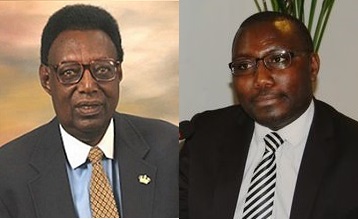By Ambrose Nzeyimana
Some years back I watched a documentary film about young children (5 to 12 years old) who were taken away from their parents because the latter, given their mentally disturbed state of mind, were incapable of taking care of them.
Two decades later, when these same children, then adults, were asked if whether not they would’ve preferred to stay at home whatever were their parents’ mental health issues, the majority of them said that they would’ve chosen to be with them.
In fact, what had happened in the meantime (during those long years away from each other) is that a good number of those children had developed mental conditions, similar, if not, worse than those of their parents they had been separated from.
When president Kagame refuses Rwandans in exile (like father Thomas Nahimana on November 23rd, 2016 or late king Kigeli V Ndahindurwa) to return to Rwanda in dignity, he behaves like those parents who could not take care of their children given their own mental issues.
You flee your home because you don’t feel safe. You are taken or pushed away from your homeland. Conditions you face in the process and momentarily are out of your control. There is not much you could’ve done about the circumstances. But you are still linked to where you come from.
Fighting back and returning to your homeland, when you feel you can, becomes a vital act of resistance, for yourself and others alike. Who knows if your motherland wouldn’t improve on its uncertain and unstable standing too (a parent without their child is never whole again). Consequently, every one can become a winner.
But beyond that question of returning home as an act of resistance, there is another dimension very fundamental which relates to the factors which makes parents (let’s consider here Rwanda as a parent for its citizens) mentally unstable.
During the recent “umushyikirano”, “national dialogue” held in Kigali in December 2016, Serverian Nzakamwita, archbishop of Byumba, raised the issue of insecurity inside the Rwandan family. This might be at a micro level of a nation. But if at a macro level, the majority of nucleus families suffers from insecurity, it’s the entire country which is insecure.
Finding and solving the problems at the root causes of families’ insecurity could be the start of improving the country’s overall security. As a government, putting one’s head in the sand and expecting that these problems will go away is only irrational and irresponsible.
At the end, there wouldn’t be any resistance if citizens’ needs were taken care of by government institutions acting as parents. Father Thomas Nahimana and his political party wouldn’t be doing everything to return to their native Rwanda, because they wouldn’t have left it in the first place. Or late king Kigeli V Ndahindurwa wouldn’t have died in a foreign land and his body forcibly returned home to be buried unceremoniously.
There are children who return to their parents’ home peacefully, driven by the nostalgia of missing familial comfort and the hunger to become whole again. But there are others who return only motivated by anger and revenge for having been deprived of their home.
Though both acts of returning home could be seen as ways of improving the conditions between the returnees and their motherland, consequences can be either damageable or beneficial, if the process is either vengeful or peaceful.
In the Rwandan situation, time will tell if returnees and current leaders in the country want to destroy whatever has been built during recent decades or only make improvements for a sustainable co-existence.
In the meantime, let’s remember this: between October 1st, 1990 and July 1994, RPF waged a civilian war against Rwanda, killed hundreds thousands of Rwandans and displaced millions inside and outside the country.
It took power in the middle of that killing which was defined internationally as the Rwandan genocide by UN. On April 6th, 1994, it had murdered 2 seating presidents: Juvenal Habyarimana of Rwanda and Cyprien Ntaryamira of Burundi. It has never been investigated so far.
With the backing of Anglo-Saxon powers, mainly US and UK, Rwanda, Uganda and Burundi invaded DRC in 1996 and occupied it in 1997. Despite change of actors on the ground, that occupation has not ended until today. It has instead caused the death of more than 8 million Congolese and 500,000 Rwandan hutu refugees, and dire impoverishment of the surviving population.
The said occupation has also enabled a massive plundering of Congolese mineral resources and systematic weakening of the country’s institutions. And beneficiaries of that stealing of DRC wealth are western US, UK, Canadian, Australian, German and other multinationals.





























































